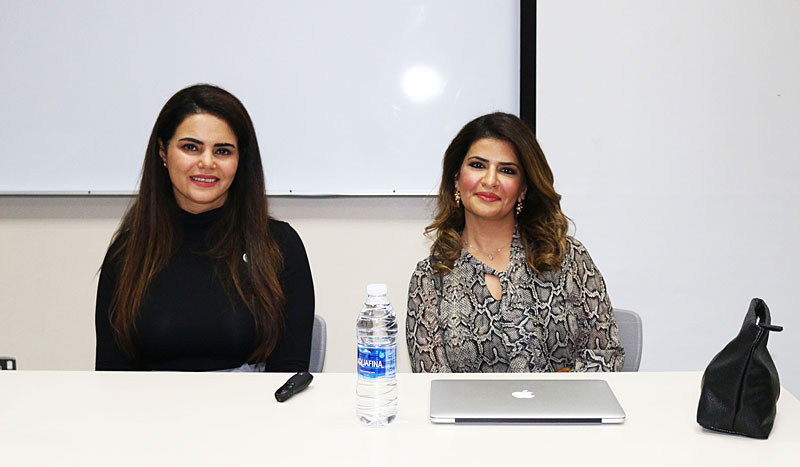Abolish153 Campaign Shares National Survey Findings with AUK Community
03rd Feb 2019 | by the Department of PR & Marketing
In recognition of the International Day for the Elimination of Violence Against Women, the Center for Gulf Studies (CGS) at AUK hosted the campaign to Abolish Article 153. In a lecture entitled, Attitudes on Violence in Kuwait, the speakers shared their findings from the Abolish 153’s national surveyon violenceto the AUK community, members of the public,and special guests such as His Excellency US Ambassador Lawrence Silverman.
Dr. Alanoud Al-Sharekh, Chairperson of Abolish 153 and Director of Ibtkar Strategic Consultancy, introduced the campaign’s primary objective —to abolish Article 153 from Kuwait’s penal code. In particular domestic situations, the law downgrades the severity of husband-initiated homicides to a misdemeanor. In this case, the punishment is a maximum of 3 years in prison and/or a 3,000 rupee (KD 14) fine. Dr. Al-Sharekh also discussed how other articles, such as Article 29 that allows for greater permissiveness regarding violence, may collectively reduce the ability for survivors of abuse to find and receive resources that would alleviate threats to themselves and their loved ones.
The campaign focuses on lobbying policymakers and advocating policies that present alternatives to Kuwait’s current legal framework on this issue, such as encouraging the State to intervene on behalf of survivors. This intervention may take the form of the provision of necessary crisis centers, legal assistance, medical aid, and functional shelters for survivors. Without these resources in place, the members of Abolish 153 have taken it upon themselves to provide some resources to survivors, all while aligning with the current laws and regulations of Kuwait. So far, eighty-six women have been assisted in various capacities.
In May 2017, the campaign’s greatest milestone was achieved when Members of Parliament signed a bill to end Article 153. Since then, the campaign’s advocacy and awareness efforts have expanded, such as providing support for the establishment of the first independent women’s shelter in Kuwait.
Dr. Al-Sharekh further discussed the general lack of availability of comprehensive and reflective national statistics on domestic violence. Due to this lack of data, Abolish153 funded the national survey that was discussed at the panel. In surveying over 700 people proportionally representing Kuwait’s community, they found disparities between respondents’ perception of domestic violence and actual case studies and experiences found in interviews. The study found that while violence against children and violence against the elderly were perceived by both sexes as important issues, violence against women was perceived as less important of an issue by men. Up to 50% of respondents indicated that this was due to the culturally embedded nature of guardianship and the value of traditional sex-gender roles. Similarly, the perpetrators were prominently perceived to be significant others, perhaps due to promotion of the stereotype by the media, whereas in discussions with survivors, the perpetrators were most likely direct relatives. In either case, scholars suggested that the results illustrate the need for government interventionand assistance.
Most notably, Al-Sharekh revealed that 53% of respondents —both men and women— have been subjected to violence. The real figure may be higher, as there is a tendency to under-report domestic violence. In spear heading the research, Dr. Fatma Al-Salem, Assistant Professor of Mass Communications at Kuwait University, shared anonymous stories from her in-depth interviews from the study. She indicated that each story indicated the need for women to be financially empowered, and the possibility for change has to begin with the immediate family. She implored the audience to discuss ongoing violence against women and to bring awareness to the campaign, to resources, and to ask for greater public assistance in the journey to eliminate domestic violence. Indeed, the scholars reminded the audience that the perpetuation of the violence was a threat to Kuwait’s values of peace and humanity.
The audience found the results striking and continued to engage in dialogue after the presentation of the statistics. One question asked about the possibility of greater involvement in the process of helping survivors. The scholars revealed that the campaign hosts an annual fundraising exhibition, which displays and sells creations by various local and international artists. The proceeds of the exhibition go to assist survivors of violence. When asked about the fates of the anonymous survivors, after hearing their stories, Dr. Al-Sharekh indicated that not all survivors remain in touch with the campaign. She continued, however, by noting that passing legislation for the protection of survivors of domestic violence would be the greatest contribution of all members of our society and the most positive legacy to leave future generations.
Dr. Shareefa Al-Adwani, Director of the Center for Gulf Studies, emphasized that bringing studies about societal difficulties, while perhaps tough to listen to, is the first step to addressing the issues, “The discussions promote greater understanding of ourselves, our society, and our culture, and offers direction in how we may begin to improve our private and public lives.” She continued, “We appreciate Drs. Al-Sharekh and Al-Salem for conducting such a far-reaching study and discussing the results with all sectors of society in order to understand where we currently stand on this issue and to understand where we want to be on this issue.”

Lecture speakers, Dr. Alanoud Al-Sharekh, and Dr. Fatma Al-Salem

Dr. Alanoud Al-Sharekh during the lecture

Member of the audience asking a question during the Q&A session

Audience members attending the lecture